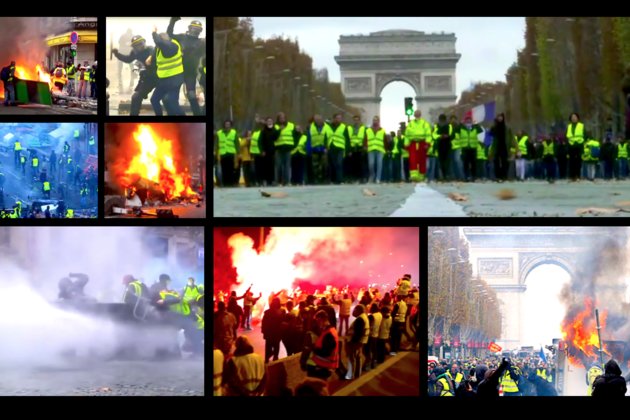2LT International News
Tear gas fired on fuel protesters in France, dozens arrested
Nov 26, 2018
PARIS, France – Tens of thousands of protesters in France continued to take to the streets protesting against rising fuel prices on Saturday, with the demonstrations quickly turning violent and leading to several injuries and arrests.
The protests dubbed the ‘yellow vest’ was organized by the grassroots movement and has grown in size after starting this summer when a group of people signed online petitions urging the French President Emmanuel Macron to reconsider the higher carbon taxes for 2018 as part of his climate change commitment.
In the first round of protests staged last weekend, more than 280,000 protesters participated in demonstrations across France, in which a network of drivers blocked roads across 2,000 locations, causing spiralling traffic problems.
The protests last week left two demonstrators dead and over 600 others injured.
Since then, protests have continued through the week, and have left about 30 security officers injured and 109 activists arrested.
On Saturday, the Interior Ministry said that over 100,000 people participated in about 1,600 protests across France and while most of them were peaceful, the protest in the capital turned violent.
The Ministry said that 5,000 police had been deployed across Paris and security had been heightened around the Champs-Elysees.
Authorities anticipated violence around the President’s official residence and the national assembly, which is France’s most famous tourist mile since protesters attempted to storm the buildings last week.
This week, despite the extra police and security cover and metal barricades being erected around the key buildings, about 8,000 demonstrators gathered there, sparking violent scenes.
The Interior Ministry said that some of the protesters tried to break through the police cordon and lit fires, tore down street signs and some even pulled up paving stones and hurled them at police.
Protests continued to shout slogans against Macron through the day causing moments of chaos on the Champs-Elysees, forcing the police to used tear gas and water cannon to disperse protesters.
A trailer was set on fire and subsequently exploded on the Champs Elysees.
Further, a man who tried to attack firefighters was overpowered by some of the demonstrators themselves.
Police and protesters also engaged in clashes on the Avenue de Friedland, where protesters were pushed back by the police who fired special rubber balls to control demonstrators.
Yet, Laetitia Dewalle, a spokesperson for the demonstrators said that the protests in the area were peaceful and added, “We are not here to pick a fight with cops, We just want the government to listen to us.”
However, the Interior Ministry said that 19 people were injured in the clashes in the area in the capital, including four officers.
Further, a total of 40 people were arrested.
Across the rest of the country too, demonstrations were staged and officials said that roadblocks were set up to slow down traffic.
According to the French State Media, several reporters suffered injuries after being attacked in the southern cities of Toulouse and Béziers.
Minor clashes in other parts of the country resulted in a total of 130 arrests.
In a brief Twitter argument, the Interior Minister Christophe Castaner accused the protesters of being influenced by the leader of the far-right National Rally party, Marine Le Pen.
However, Le Pen responded by accusing Castaner of dishonesty.
Meanwhile, the French President Emmanuel Macron slammed demonstrators who clashed with police in Paris.
He praised the security forces for “their courage and their professionalism.”
Macron tweeted, “Shame on those who attacked them. Shame on those who assaulted other citizens and journalists. There is no place for violence in the [French] Republic.”
This week, even though the ‘yellow vest’ protests were focused on the rising fuel taxes on diesel, protesters were also angry about the rising living costs and other grievances against Macron’s policies.
Dubbed the “president for the rich” by his political opponents, Macron’s economic policies have led to his popularity hitting new lows.
Over the last 18 months, the young French President has attempted to reboot the country’s economy, but his loosening of labour laws and an overhaul of the state rail operator SNCF have angered powerful trade unions that have staged massive street demonstrations.
He has also suffered several backlash from the public and his political opponents for measures such as ending the wealth tax, hiking taxes on fuel and tobacco and increasing a social welfare levy.
Protesters have continued to call on Macron to resign over his policies that they claim have abandoned “the little people.”
The price of diesel, which is the most commonly used fuel in French cars, has risen by around 23 percent over the past 12 months and currently stands at an average of 1.51 euros per litre.
It is the highest that the price of diesel has reached since the early 2000s.
Further, on January 1, 2019, his government has decided to impose a further increase of 6.5 cents on diesel and 2.9 cents on petrol.







